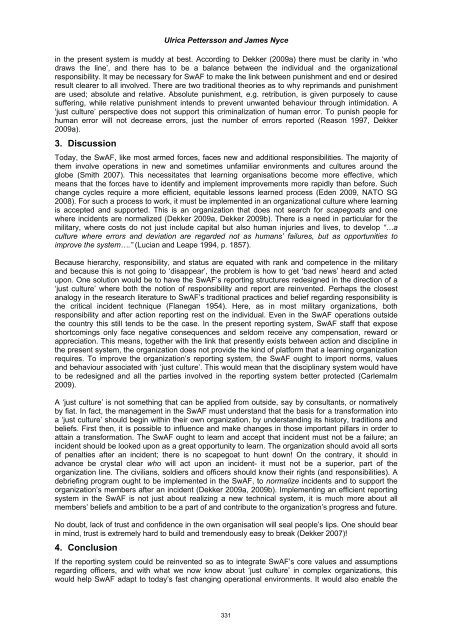Proceedings of the 3rd European Conference on Intellectual Capital
Proceedings of the 3rd European Conference on Intellectual Capital
Proceedings of the 3rd European Conference on Intellectual Capital
Create successful ePaper yourself
Turn your PDF publications into a flip-book with our unique Google optimized e-Paper software.
Ulrica Petterss<strong>on</strong> and James Nyce<br />
in <str<strong>on</strong>g>the</str<strong>on</strong>g> present system is muddy at best. According to Dekker (2009a) <str<strong>on</strong>g>the</str<strong>on</strong>g>re must be clarity in ‘who<br />
draws <str<strong>on</strong>g>the</str<strong>on</strong>g> line’, and <str<strong>on</strong>g>the</str<strong>on</strong>g>re has to be a balance between <str<strong>on</strong>g>the</str<strong>on</strong>g> individual and <str<strong>on</strong>g>the</str<strong>on</strong>g> organizati<strong>on</strong>al<br />
resp<strong>on</strong>sibility. It may be necessary for SwAF to make <str<strong>on</strong>g>the</str<strong>on</strong>g> link between punishment and end or desired<br />
result clearer to all involved. There are two traditi<strong>on</strong>al <str<strong>on</strong>g>the</str<strong>on</strong>g>ories as to why reprimands and punishment<br />
are used; absolute and relative. Absolute punishment, e.g. retributi<strong>on</strong>, is given purposely to cause<br />
suffering, while relative punishment intends to prevent unwanted behaviour through intimidati<strong>on</strong>. A<br />
‘just culture’ perspective does not support this criminalizati<strong>on</strong> <str<strong>on</strong>g>of</str<strong>on</strong>g> human error. To punish people for<br />
human error will not decrease errors, just <str<strong>on</strong>g>the</str<strong>on</strong>g> number <str<strong>on</strong>g>of</str<strong>on</strong>g> errors reported (Reas<strong>on</strong> 1997, Dekker<br />
2009a).<br />
3. Discussi<strong>on</strong><br />
Today, <str<strong>on</strong>g>the</str<strong>on</strong>g> SwAF, like most armed forces, faces new and additi<strong>on</strong>al resp<strong>on</strong>sibilities. The majority <str<strong>on</strong>g>of</str<strong>on</strong>g><br />
<str<strong>on</strong>g>the</str<strong>on</strong>g>m involve operati<strong>on</strong>s in new and sometimes unfamiliar envir<strong>on</strong>ments and cultures around <str<strong>on</strong>g>the</str<strong>on</strong>g><br />
globe (Smith 2007). This necessitates that learning organisati<strong>on</strong>s become more effective, which<br />
means that <str<strong>on</strong>g>the</str<strong>on</strong>g> forces have to identify and implement improvements more rapidly than before. Such<br />
change cycles require a more efficient, equitable less<strong>on</strong>s learned process (Eden 2009, NATO SG<br />
2008). For such a process to work, it must be implemented in an organizati<strong>on</strong>al culture where learning<br />
is accepted and supported. This is an organizati<strong>on</strong> that does not search for scapegoats and <strong>on</strong>e<br />
where incidents are normalized (Dekker 2009a, Dekker 2009b). There is a need in particular for <str<strong>on</strong>g>the</str<strong>on</strong>g><br />
military, where costs do not just include capital but also human injuries and lives, to develop “…a<br />
culture where errors and deviati<strong>on</strong> are regarded not as humans’ failures, but as opportunities to<br />
improve <str<strong>on</strong>g>the</str<strong>on</strong>g> system….” (Lucian and Leape 1994, p. 1857).<br />
Because hierarchy, resp<strong>on</strong>sibility, and status are equated with rank and competence in <str<strong>on</strong>g>the</str<strong>on</strong>g> military<br />
and because this is not going to ‘disappear’, <str<strong>on</strong>g>the</str<strong>on</strong>g> problem is how to get ‘bad news’ heard and acted<br />
up<strong>on</strong>. One soluti<strong>on</strong> would be to have <str<strong>on</strong>g>the</str<strong>on</strong>g> SwAF’s reporting structures redesigned in <str<strong>on</strong>g>the</str<strong>on</strong>g> directi<strong>on</strong> <str<strong>on</strong>g>of</str<strong>on</strong>g> a<br />
‘just culture’ where both <str<strong>on</strong>g>the</str<strong>on</strong>g> noti<strong>on</strong> <str<strong>on</strong>g>of</str<strong>on</strong>g> resp<strong>on</strong>sibility and report are reinvented. Perhaps <str<strong>on</strong>g>the</str<strong>on</strong>g> closest<br />
analogy in <str<strong>on</strong>g>the</str<strong>on</strong>g> research literature to SwAF’s traditi<strong>on</strong>al practices and belief regarding resp<strong>on</strong>sibility is<br />
<str<strong>on</strong>g>the</str<strong>on</strong>g> critical incident technique (Flanegan 1954). Here, as in most military organizati<strong>on</strong>s, both<br />
resp<strong>on</strong>sibility and after acti<strong>on</strong> reporting rest <strong>on</strong> <str<strong>on</strong>g>the</str<strong>on</strong>g> individual. Even in <str<strong>on</strong>g>the</str<strong>on</strong>g> SwAF operati<strong>on</strong>s outside<br />
<str<strong>on</strong>g>the</str<strong>on</strong>g> country this still tends to be <str<strong>on</strong>g>the</str<strong>on</strong>g> case. In <str<strong>on</strong>g>the</str<strong>on</strong>g> present reporting system, SwAF staff that expose<br />
shortcomings <strong>on</strong>ly face negative c<strong>on</strong>sequences and seldom receive any compensati<strong>on</strong>, reward or<br />
appreciati<strong>on</strong>. This means, toge<str<strong>on</strong>g>the</str<strong>on</strong>g>r with <str<strong>on</strong>g>the</str<strong>on</strong>g> link that presently exists between acti<strong>on</strong> and discipline in<br />
<str<strong>on</strong>g>the</str<strong>on</strong>g> present system, <str<strong>on</strong>g>the</str<strong>on</strong>g> organizati<strong>on</strong> does not provide <str<strong>on</strong>g>the</str<strong>on</strong>g> kind <str<strong>on</strong>g>of</str<strong>on</strong>g> platform that a learning organizati<strong>on</strong><br />
requires. To improve <str<strong>on</strong>g>the</str<strong>on</strong>g> organizati<strong>on</strong>’s reporting system, <str<strong>on</strong>g>the</str<strong>on</strong>g> SwAF ought to import norms, values<br />
and behaviour associated with ‘just culture’. This would mean that <str<strong>on</strong>g>the</str<strong>on</strong>g> disciplinary system would have<br />
to be redesigned and all <str<strong>on</strong>g>the</str<strong>on</strong>g> parties involved in <str<strong>on</strong>g>the</str<strong>on</strong>g> reporting system better protected (Carlemalm<br />
2009).<br />
A ‘just culture’ is not something that can be applied from outside, say by c<strong>on</strong>sultants, or normatively<br />
by fiat. In fact, <str<strong>on</strong>g>the</str<strong>on</strong>g> management in <str<strong>on</strong>g>the</str<strong>on</strong>g> SwAF must understand that <str<strong>on</strong>g>the</str<strong>on</strong>g> basis for a transformati<strong>on</strong> into<br />
a ‘just culture’ should begin within <str<strong>on</strong>g>the</str<strong>on</strong>g>ir own organizati<strong>on</strong>, by understanding its history, traditi<strong>on</strong>s and<br />
beliefs. First <str<strong>on</strong>g>the</str<strong>on</strong>g>n, it is possible to influence and make changes in those important pillars in order to<br />
attain a transformati<strong>on</strong>. The SwAF ought to learn and accept that incident must not be a failure; an<br />
incident should be looked up<strong>on</strong> as a great opportunity to learn. The organizati<strong>on</strong> should avoid all sorts<br />
<str<strong>on</strong>g>of</str<strong>on</strong>g> penalties after an incident; <str<strong>on</strong>g>the</str<strong>on</strong>g>re is no scapegoat to hunt down! On <str<strong>on</strong>g>the</str<strong>on</strong>g> c<strong>on</strong>trary, it should in<br />
advance be crystal clear who will act up<strong>on</strong> an incident- it must not be a superior, part <str<strong>on</strong>g>of</str<strong>on</strong>g> <str<strong>on</strong>g>the</str<strong>on</strong>g><br />
organizati<strong>on</strong> line. The civilians, soldiers and <str<strong>on</strong>g>of</str<strong>on</strong>g>ficers should know <str<strong>on</strong>g>the</str<strong>on</strong>g>ir rights (and resp<strong>on</strong>sibilities). A<br />
debriefing program ought to be implemented in <str<strong>on</strong>g>the</str<strong>on</strong>g> SwAF, to normalize incidents and to support <str<strong>on</strong>g>the</str<strong>on</strong>g><br />
organizati<strong>on</strong>’s members after an incident (Dekker 2009a, 2009b). Implementing an efficient reporting<br />
system in <str<strong>on</strong>g>the</str<strong>on</strong>g> SwAF is not just about realizing a new technical system, it is much more about all<br />
members’ beliefs and ambiti<strong>on</strong> to be a part <str<strong>on</strong>g>of</str<strong>on</strong>g> and c<strong>on</strong>tribute to <str<strong>on</strong>g>the</str<strong>on</strong>g> organizati<strong>on</strong>’s progress and future.<br />
No doubt, lack <str<strong>on</strong>g>of</str<strong>on</strong>g> trust and c<strong>on</strong>fidence in <str<strong>on</strong>g>the</str<strong>on</strong>g> own organisati<strong>on</strong> will seal people’s lips. One should bear<br />
in mind, trust is extremely hard to build and tremendously easy to break (Dekker 2007)!<br />
4. C<strong>on</strong>clusi<strong>on</strong><br />
If <str<strong>on</strong>g>the</str<strong>on</strong>g> reporting system could be reinvented so as to integrate SwAF’s core values and assumpti<strong>on</strong>s<br />
regarding <str<strong>on</strong>g>of</str<strong>on</strong>g>ficers, and with what we now know about ‘just culture’ in complex organizati<strong>on</strong>s, this<br />
would help SwAF adapt to today’s fast changing operati<strong>on</strong>al envir<strong>on</strong>ments. It would also enable <str<strong>on</strong>g>the</str<strong>on</strong>g><br />
331
















